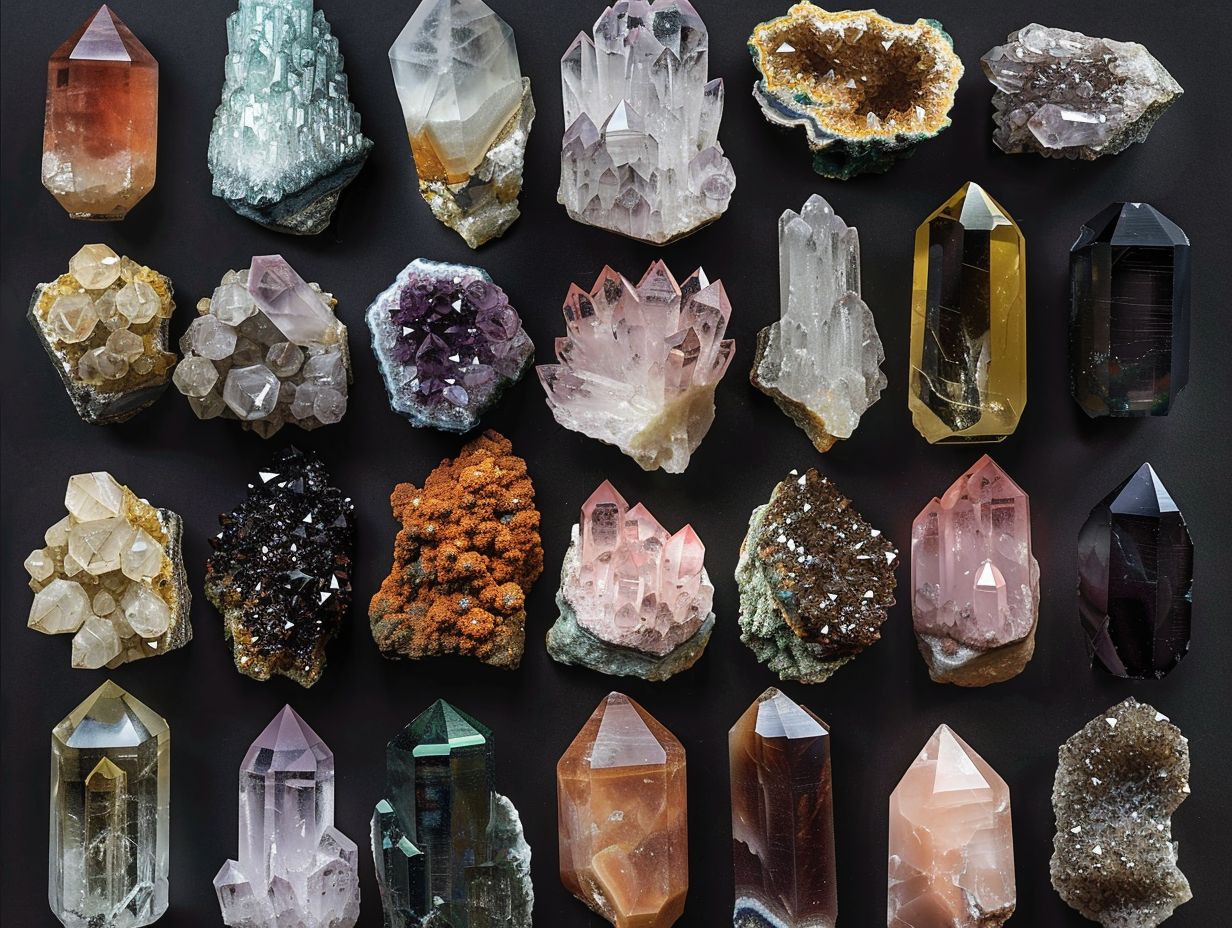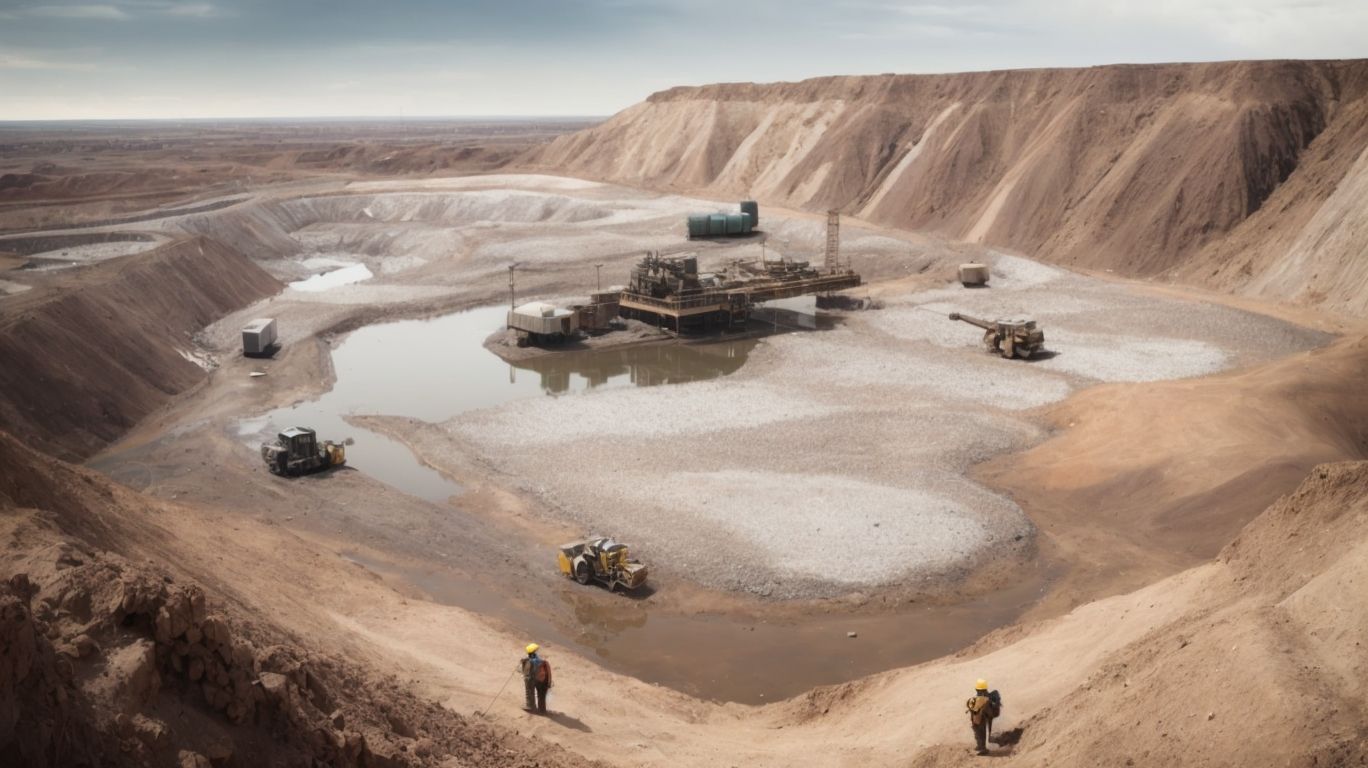
Ethical Considerations in the Crystal Extraction Industry
The crystal extraction industry is a booming business, but behind the sparkle lies a dark side.
We will explore the ethical concerns surrounding the extraction of crystals, including exploitation of workers, environmental impact, human rights violations, and cultural appropriation.
We will also discuss the ethical standards that should be upheld in the industry, such as fair trade practices, sustainable mining, respect for indigenous cultures, and transparency in the supply chain.
Delve into the consequences of unethical practices and find tips on how consumers can support ethical practices in the industry.
What Is The Crystal Extraction Industry?
The crystal extraction industry involves the mining and processing of crystals or gemstones from the Earth’s crust.
Crystals are extracted through a series of meticulous processes starting with prospecting to locate viable deposits. Once identified, mining operations are initiated using various techniques such as open-pit mining or underground mining. These methods ensure the extraction of different types of crystals like quartz, diamonds, and amethyst. After extraction, the crystals undergo processing, which includes cutting, polishing, and shaping to enhance their aesthetic appeal and value. This industry plays a significant role in sectors like jewelry making, technology, and holistic healing, providing materials for manufacturing, energy generation, and metaphysical practices.
What Are The Ethical Concerns In The Crystal Extraction Industry?
The crystal extraction industry is fraught with ethical concerns related to sustainability, labor practices, human rights violations, environmental impact, and fair trade practices.
These challenges have raised significant alarms about the need for transparency in the sourcing of crystals, the treatment of workers in mining areas, and the overall social responsibility of companies involved in this industry. Unethical practices not only affect the environment but also have a profound impact on local communities and indigenous populations. Responsible sourcing practices and stakeholder engagement are crucial in ensuring that the extraction of crystals benefits all parties involved and upholds ethical standards.
Exploitation Of Workers
The exploitation of workers in the crystal extraction industry raises serious ethical concerns regarding fair trade practices, labor conditions, human rights violations, and the ethical treatment of workers.
This issue sheds light on the importance of upholding fair labor practices and ensuring the protection of workers’ rights in industries that rely on mineral extraction.
It is crucial for companies to prioritize the ethical treatment of their workers, providing them with safe working conditions, fair wages, and opportunities for growth.
Responsible sourcing practices not only benefit the workers directly involved but also contribute to building a more sustainable and equitable global supply chain for these valuable resources.
Environmental Impact
The environmental impact of crystal extraction poses significant ethical dilemmas related to sustainability, responsible sourcing, ethical mining practices, and the transparency of environmental impact assessments.
Mining for crystals involves extensive land disturbance, habitat destruction, water pollution, and carbon emissions from machinery operation. These activities can harm local ecosystems, disrupt wildlife habitats, and contribute to soil erosion.
Implementing sustainable mining practices such as land reclamation, water recycling, and reduced carbon footprint can mitigate these negative effects. Establishing ethical sourcing policies ensures that crystals are obtained without exploiting workers or causing social harm, while promoting fair trade.
Transparency in environmental assessments is crucial to hold mining companies accountable for their impact on the environment and nearby communities.
Human Rights Violations
Human rights violations in the crystal extraction industry highlight the critical need for ethical mining practices, ethical leadership, and a strong sense of ethical responsibility towards safeguarding human rights.
These violations underscore the urgency for companies and governments to prioritize ethical considerations in the extraction of crystals. Upholding ethical mining standards not only ensures the protection of human rights but also fosters sustainable development and promotes social justice.
Ethical leadership plays a pivotal role in setting the tone for ethical practices within the industry. It is imperative for leaders to advocate for fair treatment of workers, communities, and the environment. By adhering to ethical principles, stakeholders can create a more just and equitable landscape for all involved in the crystal extraction process.
Cultural Appropriation
Cultural appropriation within the crystal extraction industry raises ethical concerns regarding respect for cultural values, ethical conduct, and the implications of cultural insensitivity in the sourcing and trade of crystals.
It is crucial for individuals involved in the crystal extraction industry to understand the importance of cultural sensitivity and ethical considerations when engaging in the sourcing and trade of these precious materials. The exploitation of cultural practices and traditions for personal gain can lead to harmful consequences, perpetuating a cycle of disrespect and disregard for the communities from which these crystals originate. By promoting ethical conduct and demonstrating cultural respect in all interactions within the industry, stakeholders can work towards building a more inclusive and sustainable environment for crystal extraction.
What Are The Ethical Standards For The Crystal Extraction Industry?
Ethical standards in the crystal extraction industry encompass fair trade practices, sustainable mining methods, respect for indigenous cultures, transparency in the supply chain, and adherence to ethical policies and certification.
These ethical standards serve as essential guidelines for companies involved in crystal extraction, ensuring that the sourcing of these precious materials is done in an environmentally conscious and socially responsible manner. By prioritizing fair trade practices, companies can support local communities and uphold the rights of workers involved in the mining process.
Sustainable mining approaches not only preserve the natural resources for future generations but also minimize the ecological impact of extraction activities. Transparency in the supply chain is crucial to trace the journey of crystals from mine to market, allowing for accountability and ethical sourcing practices.
Ethical certifications and regular auditing play a vital role in validating these standards, providing assurance to consumers that the crystals they purchase are ethically sourced.
Fair Trade Practices
Fair trade practices in the crystal extraction industry are vital for ensuring responsible sourcing, ethical supply chain management, and the implementation of ethical business practices.
This approach safeguards the rights of workers in crystal mines, promoting fair wages and safe working conditions. By adhering to fair trade standards, companies can prevent exploitation and contribute to the well-being of local communities. Ethical sourcing methods also prioritize environmental sustainability, minimizing the negative impact of mining activities on ecosystems. Upholding ethical guidelines fosters transparency and accountability throughout the supply chain, building trust with consumers who value ethically sourced products. Incorporating fair trade principles into crystal extraction processes is essential for fostering a more equitable and sustainable industry.
Sustainable Mining
Sustainable mining practices in the crystal extraction industry play a crucial role in mitigating environmental impact, promoting sustainability, and adhering to ethical sourcing policies and principles.
It is imperative for companies engaged in crystal extraction to recognize the significance of aligning their operations with ethical and sustainable practices. By integrating ethical principles in mining activities, such as ensuring fair labor practices and minimizing harm to local ecosystems, these companies can contribute to a more responsible and environmentally conscious industry.
Embracing sustainable mining not only benefits the environment but also enhances the reputation of the company and fosters trust among consumers who value ethical sourcing. As awareness grows around the importance of ethical considerations in mining, the demand for responsibly sourced crystals continues to rise, highlighting the need for a shift towards eco-friendly practices.
Respect For Indigenous Cultures
Respecting indigenous cultures in the crystal extraction industry is essential for fostering community engagement, ethical leadership, and upholding ethical responsibilities towards cultural preservation.
By incorporating indigenous perspectives into the planning and execution of crystal extraction activities, companies can establish mutually beneficial relationships with local communities. This engagement not only acknowledges the traditional knowledge and practices of indigenous peoples but also promotes sustainable practices that respect the land and its resources.
Ethical leadership in this context involves actively seeking input from indigenous leaders and experts, ensuring that decisions are made in a transparent and inclusive manner. Upholding these principles helps in preserving cultural heritage and contributes to a more harmonious relationship between industry stakeholders and indigenous communities.
Transparency In Supply Chain
Transparency in the supply chain of the crystal extraction industry is crucial for demonstrating social responsibility, maintaining corporate ethics, and adhering to ethical sourcing policies with active stakeholder involvement.
By promoting transparency in the crystal extraction supply chain, companies can effectively address ethical considerations and uphold sustainable practices. Engaging stakeholders in the sourcing process not only ensures accountability but also fosters trust and credibility. This openness allows for better monitoring of working conditions, environmental impacts, and fair labor practices, ultimately benefiting not only the companies but also the communities and environment involved. Embracing transparency is a proactive approach to ethical business conduct that sets a positive example for the industry as a whole.
What Are The Consequences Of Unethical Practices In The Crystal Extraction Industry?
The consequences of unethical practices in the crystal extraction industry can result in a negative impact on communities, environmental damage, legal ramifications, and pose significant ethical challenges.
When companies engage in unethical crystal extraction practices, they often exploit vulnerable communities, leading to economic instability and social discord. The environmental degradation caused by irresponsible mining can devastate ecosystems and threaten biodiversity. These actions may also lead to potential legal consequences such as fines, lawsuits, and regulatory sanctions. The ethical dilemmas that arise from prioritizing profit over social responsibility can tarnish a company’s reputation and erode trust with stakeholders.
Negative Impact On Communities
The negative impact of unethical practices in the crystal extraction industry extends to communities, highlighting the importance of social responsibility, ethical conduct, and community engagement in fostering ethical practices.
These detrimental effects can manifest in various ways, from environmental degradation to exploitation of local populations. By disregarding ethical considerations in the extraction process, companies not only harm the environment but also disrupt the social fabric of communities. Recognizing the interconnectedness of environmental sustainability and community well-being, it is crucial for companies to prioritize ethical conduct and engage meaningfully with local stakeholders. Genuine community engagement can help address concerns, build trust, and ensure that crystal extraction benefits communities rather than causing harm.
Damage To Environment
Environmental damage caused by unethical practices in the crystal extraction industry underscores the critical need for sustainability, environmental impact assessment, and the implementation of ethical sourcing policies.
This issue goes beyond the immediate environmental repercussions of unchecked crystal extraction. It points to the larger dilemma of balancing economic gains with ecological integrity. Sustainable measures not only protect our planet’s delicate ecosystems but also ensure the well-being of future generations.
By conducting thorough environmental impact assessments, companies can better understand the consequences of their actions and make informed decisions. Embracing ethical sourcing policies promotes transparency and accountability throughout the entire supply chain, fostering a culture of respect for both the environment and local communities affected by mining operations.
Legal Ramifications
Unethical practices in the crystal extraction industry can lead to legal ramifications, underscoring the importance of conflict-free minerals, ethical certification, and rigorous ethical auditing processes.
- Companies involved in crystal extraction must adhere to legal compliance to avoid penalties and lawsuits.
- Implementing ethical certification standards can not only enhance the reputation of the business but also ensure responsible sourcing practices.
- Robust ethical auditing mechanisms play a crucial role in monitoring and verifying the supply chain to guarantee that no human rights violations or environmental damages occur during the extraction process.
By prioritizing ethical considerations, the industry can move towards a more sustainable and accountable approach to crystal mining.
What Can Consumers Do To Support Ethical Practices In The Crystal Extraction Industry?
Consumers can play a crucial role in supporting ethical practices in the crystal extraction industry by researching the source of crystals, purchasing from ethical companies, educating others on the issue, and advocating for ethical standards.
By taking the time to understand where their crystals come from, consumers can ensure they are not supporting unethical practices like child labor or environmental degradation. Choosing to buy from reputable and transparent brands that prioritize sustainable sourcing and fair labor practices empowers consumers to make a positive impact. Spreading awareness about the importance of ethical crystal extraction within their communities can create a ripple effect of change, encouraging more people to make informed choices. Ultimately, consumer actions have the power to drive industry standards towards greater ethical responsibility.
Research The Source Of Crystals
Researching the source of crystals is essential for consumers to ensure ethical sourcing practices, transparency, and support for fair trade in the crystal extraction industry.
By delving into the origins of crystals they purchase, individuals can play a vital role in promoting responsible consumer behavior. Ethical sourcing policies not only guarantee that the communities involved in crystal extraction are treated fairly but also help protect the environment and ensure sustainable practices.
Understanding the journey of a crystal from mine to market empowers buyers to make informed choices, supporting companies that prioritize ethical considerations. By demanding transparency and endorsing fair trade practices, consumers contribute to a more ethical supply chain within the crystal industry.
Purchase From Ethical Companies
Supporting ethical companies in the crystal extraction industry is crucial for consumers to promote ethical supply chains, corporate ethics, and fair trade practices in the sourcing of crystals.
By choosing products from companies that prioritize ethical practices, consumers can play a significant role in fostering sustainability and responsible sourcing methods. Ethical supply chains ensure that workers are treated fairly and environmentally-friendly practices are implemented throughout the production process. Corporate ethics help build trust between companies and consumers, showcasing a commitment to transparency and accountability. Supporting fair trade principles not only benefits producers in developing countries but also contributes to the global effort towards social and environmental responsibility in the supply chain.
Educate Others On The Issue
Educating others on the ethical challenges in the crystal extraction industry is a key step for consumers to raise awareness, foster ethical responsibility, and promote community engagement.
By sharing knowledge about the impact of unsustainable mining practices on the environment and local communities, individuals can make informed decisions about where their crystals come from.
Encouraging dialogue around fair labor practices and supporting businesses that prioritize ethical sourcing can drive positive change in the industry.
It is crucial for people to recognize their power as consumers in influencing companies to prioritize ethics over profit.
Embracing educational initiatives and actively engaging with ethical issues can lead to a more sustainable and responsible approach to crystal consumption.
Advocate For Ethical Standards
Advocating for ethical standards in the crystal extraction industry empowers consumers to demand ethical leadership, social responsibility, and ethical conduct from companies involved in the sourcing and trade of crystals.
By championing transparency and accountability in the supply chain, consumers in this industry have the power to influence practices that align with their values.
Ethical leadership drives the commitment to fair labor practices, environmental sustainability, and community welfare, fostering a culture of integrity and trust.
Emphasizing the importance of ethical conduct not only safeguards vulnerable communities but also promotes a healthier, more sustainable industry that resonates with conscientious consumers.




No Comments